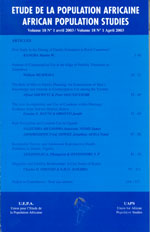
|
African Population Studies
Union for African Population Studies
ISSN: 0850-5780
Vol. 27, No. 2s, 2014, pp. 372-385
|
 Bioline Code: ep13032
Bioline Code: ep13032
Full paper language: English
Document type: Research Article
Document available free of charge
|
|
|
African Population Studies, Vol. 27, No. 2s, 2014, pp. 372-385
| fr |
Omoluabi, Elizabeth; Aina, Olabisi Idowu & Attanasso, Marie Odile
Résumé
En dépit des initiatives régionales et internationales pour promouvoir l'égalité des sexes, l'Afrique demeure un continent pauvre en statistiques du genre. Ceci est une étude de réfection sur le statut du genre et des statistiques du genre au Nigeria sur la base d'une analyse des données secondaires ainsi qu'une évaluation rapide de six organismes clés sensés être a l'avant de la cause du genre. Notre étude montre que les organis- mes et secteurs qui sont sensés conduire la réflexion nationale dans le domaine du genre manquent de capacités techniques de base ainsi que d'engagement. Il est impérative de mettre en place un vaste system de formation et de renforcement des capacités dans l'analyse du genre pour faire face au déséquilibre systé- matique causé par l'inégalité du genre tant au niveau national que régional et pour atteindre les objectifs internationaux sur les statistiques du genre. L'avancement des objectifs des statistiques du genre est essen- tiel pour le développement du Nigeria.
Mots Clés
Genre, égalité de genre, inégalité de genre, statistiques officielles.
|
| |
| en |
Gender in Nigeria’s development discourse: relevance of gender statistics
Omoluabi, Elizabeth; Aina, Olabisi Idowu & Attanasso, Marie Odile
Abstract
In spite of the various regional and international initiatives to promote gender equality, Africa remains a continent with poor gender statistics. This paper presents a reflective explorative discourse on the status of gender and gender statistics in Nigeria, using secondary data as well as a rapid assessment of six key organisations identified as drivers of the “gender agenda”. Our study shows that organisations and sectors mandated to provide leadership for the production and use of gender statistics in Nigeria lack basic technical competencies and show very little commitment to the engendering process. Production and access to gender statistics is still plagued by misunderstanding of the concept of gender as a planning tool, especially in the non-traditional sectors which have remained the domain of men. Extensive capacity building on gender statistics is necessary and urgent so as to document and begin to address the systemic imbalance caused by gender inequality both at national and regional levels; and to attain international goals on gender statistics. Advancing the goals of gender statistics in Nigeria is prime to its development agenda
Keywords
Gender; gender equality; gender inequality; gender agenda; official statistics.
|
| |
© Copyright 2014 - African Population Studies
Alternative site location: http://www.uaps-uepa.org
|
|
